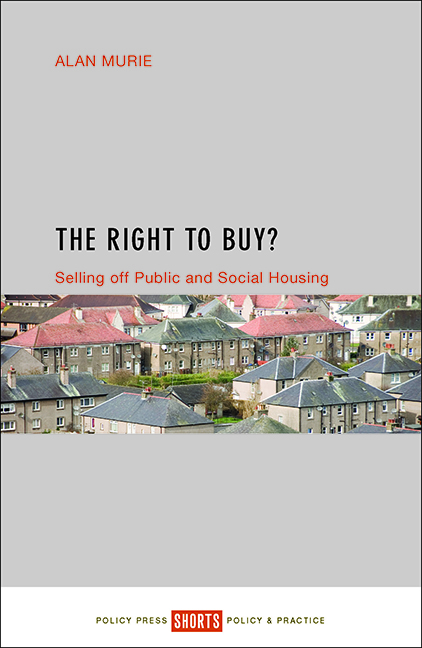Book contents
- Frontmatter
- Contents
- List of tables and figures
- About the author
- Acknowledgements
- 1 Introduction
- 2 Selling public housing: precursors and preconditions
- 3 A policy history of the Right to Buy, 1980-2015
- 4 Statistics and impacts of the Right to Buy
- 5 A policy commentary
- 6 The next phase: extending the Right to Buy in England
- 7 Conclusions: public and social housing: slow death or new beginnings?
- References
- Index
2 - Selling public housing: precursors and preconditions
Published online by Cambridge University Press: 05 April 2022
- Frontmatter
- Contents
- List of tables and figures
- About the author
- Acknowledgements
- 1 Introduction
- 2 Selling public housing: precursors and preconditions
- 3 A policy history of the Right to Buy, 1980-2015
- 4 Statistics and impacts of the Right to Buy
- 5 A policy commentary
- 6 The next phase: extending the Right to Buy in England
- 7 Conclusions: public and social housing: slow death or new beginnings?
- References
- Index
Summary
Introduction
This chapter outlines the origins of public sector housing and its critical role in the improvement of housing supply and housing conditions in in the UK after 1919. It grew to house almost one in every three households in the UK, and this made the potential reach of privatisation considerable. The chapter also outlines debates and the development of policy and practice in selling council properties before the introduction of the Right to Buy in 1980 – and suggests that these helped shape the direction of subsequent housing privatisation.
Building and selling council houses before 1951
The origins of public housing in the UK are rooted in 19th-century legislation, but before the introduction of Exchequer subsidies in 1919, few municipal dwellings had been built. Accounts of public health and housing policy before 1919 refer to a plethora of legislation, but little council housebuilding. Merrett (1979, pp 19-20) refers to three legislative periods leading up to 1914. In the first (1851-75) it became possible for local authorities to build lodging houses within which accommodation was communal. In the second period (1875-90) powers to build council housing were used, but the costs of compensation and construction presented too great a challenge to most councils. It was in the third period, from 1890 onwards, that most municipal dwellings were built, before 1914.
The Housing of the Working Classes Act 1890 provided the legislative basis for the development of council housing, and the Housing and Town Planning Act 1909 enabled local councils to declare town planning schemes related to specific areas of new development and provided powers that facilitated the building of council dwellings. There was, however, no obligation placed on councils to build, and no financial help from central government to help bridge the gap between costs and the rents that working-class tenants could afford. Some local authorities were also convinced that their intervention in the market would adversely affect the contribution of the private sector: providing municipal housing with subsidised rents would make housing problems worse. Consequently, many local authorities chose not to build council housing. They had concerns about the effect of municipal activity (whether subsidised or not) on private investment in new building, on the housing market and on wages, and about the problems of letting such dwellings at affordable rents in the absence of subsidy other than through providing subsidised land or rate borne subsidy.
- Type
- Chapter
- Information
- The Right to Buy?Selling off Public and Social Housing, pp. 9 - 30Publisher: Bristol University PressPrint publication year: 2016



